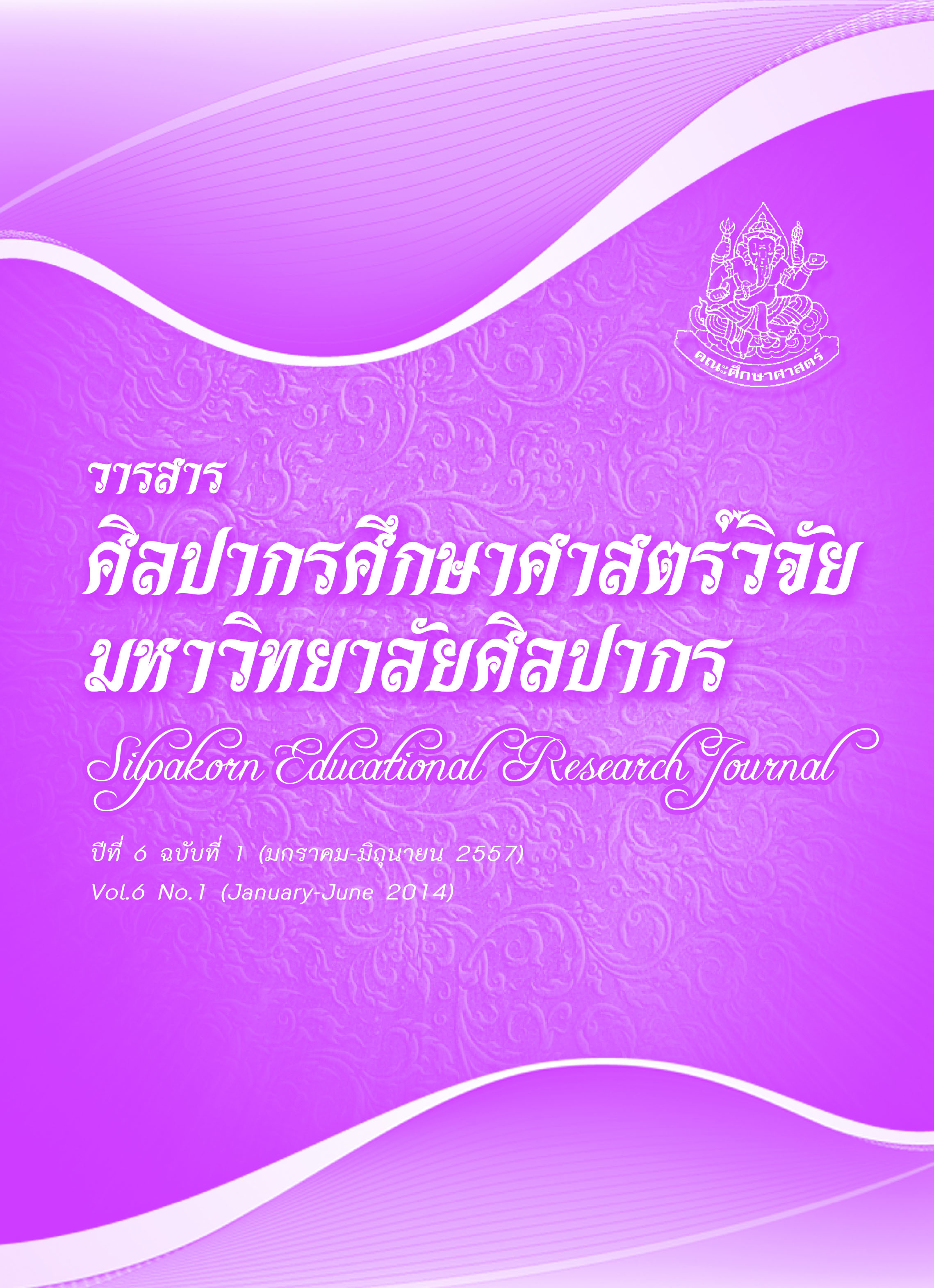ปัจจัยที่ส่งผลต่อการเป็นสถาบันอุดมศึกษาในกำกับของรัฐของวิทยาลัยพยาบาล สังกัดสถาบันพระบรมราชชนก
Main Article Content
Abstract
การวิจัยนี้มีวัตถุประสงค์ 1) เพื่อทราบปัจจัยที่ส่งผลต่อการเป็นสถาบันอุดมศึกษาในกำกับของรัฐของวิทยาลัยพยาบาล สังกัดสถาบันพระบรมราชชนกจากการวิเคราะห์เชิงปริมาณ 2) เพื่อทราบปัจจัยที่ส่งผลต่อการเป็นสถาบันอุดมศึกษาในกำกับของรัฐของวิทยาลัยพยาบาล สังกัดสถาบัน พระบรมราชชนกจากการวิเคราะห์เชิงคุณภาพ และ 3) เพื่อสังเคราะห์ปัจจัยที่ส่งผลต่อการเป็นสถาบัน อุดมศึกษาในกำกับของรัฐของวิทยาลัยพยาบาล สังกัดสถาบันพระบรมราชชนก เครื่องมือที่ใช้ในการวิเคราะห์เชิงปริมาณคือ แบบสัมภาษณ์กึ่งโครงสร้างและแบบสอบถามความคิดเห็น ผู้ให้ข้อมูลประกอบด้วยรองผู้อำนวยการ หัวหน้างาน หัวหน้าภาควิชา อาจารย์ ข้าราชการที่ไม่ทำหน้าที่สอน ลูกจ้างประจำ ลูกจ้างชั่วคราว และพนักงานราชการ จากลุ่มตัวอย่าง 26 วิทยาลัย รวม 234 คน ระหว่างเดือนมิถุนายน ถึง เดือนกันยายน 2555 สถิติที่ใช้ คือค่าความถี่ ค่าร้อยละ ค่าเฉลี่ย ส่วนเบี่ยงเบนมาตรฐานและการวิเคราะห์องค์ประกอบเชิงสำรวจ ส่วนการวิเคราะห์เชิงคุณภาพแบบ EDFR เครื่องมือที่ใช้คือ แบบสัมภาษณ์กึ่งโครงสร้างและแบบสอบถามความคิดเห็น ผู้ให้ข้อมูลเป็นผู้ทรงคุณวุฒิ จำนวน 17 คน สถิติที่ใช้คือ ค่ามัธยฐานและค่าพิสัยระหว่างควอไทล์ ผลการวิจัย พบว่า 1) ปัจจัยจากการวิเคราะห์เชิงปริมาณมี 7 ปัจจัยคือ (1) การบริหารจัดการ (2) บรรยากาศที่ส่งเสริมให้เกิดการเปลี่ยนแปลง (3) การเงินและทรัพย์สิน (4) การสนับสนุนการทำและเผยแพร่งานวิจัยและระบบเทคโนโลยีสารสนเทศ (5) การสื่อสารและประเมินผลปรับปรุงการดำเนินงาน (6) สมรรถนะของผู้บริหาร (7) ธรรมาภิบาล 2) ปัจจัยจากการวิเคราะห์เชิงคุณภาพ มี 9 ปัจจัย คือ (1) ภาวะผู้นำการเปลี่ยนแปลงของผู้บริหาร (2) สมรรถนะของบุคลากร (3) ธรรมาภิบาลและระบบบริหารจัดการ (4) การบริหารทรัพยากรมนุษย์ (5) โครงสร้างพื้นฐานและการแสวงหาเงินรายได้(6) เสรีภาพทางวิชาการ (7) การสื่อสารและประชาสัมพันธ์ (8) อำนาจนิติบัญญัติ และ(9) แรงสนับสนุน 3) ปัจจัยจาก การสังเคราะห์มีความสอดคล้องกันคือ (1) ด้านการบริหารจัดการ (2) ด้านการเงิน (3) ด้านระบบเทคโนโลยีสารสนเทศ (4) ด้านการสื่อสาร (5) ด้านภาวะผู้นำการเปลี่ยนแปลงของผู้บริหาร (6) ด้านธรรมาภิบาล และ (7) ด้านแรงสนับสนุน แต่แตกต่างกันคือ ด้านอำนาจนิติบัญญัติ
The purposes of this research were 1) to determine the effect factors of being autonomous higher education institute of nursing colleges from quantitative analysis; 2) to determine the effect factors of being autonomous higher education institute of nursing colleges from qualitative analysis; and 3) to synthesize those the effect factors of being autonomous higher education institute of nursing colleges. For quantitative analysis; two hundred and thirty-four respondents including deputy directors, heads of department, heads of division, instructors, supportive officers, permanent employees, temporary employees and government employees were recruited from 26 colleges. Data were collected during June to September 2012 and they were analyzed by using frequencies, percentage, arithmetic mean, standard deviation and exploratory factor analysis. Qualitative analysis based on EDFR. Semi-structure interview and opinionnaire were used to interview 17 experts while median and inter-quartile range were used to analyze qualitative data. The findings revealed that: 1) Seven the effect factors were found from the quantitative analysis. They were (1) administration (2) encouraged change atmosphere (3) finance and assets (4) conducting and publishing research support and information technology system (5) communication, evaluation and work improvement (6) leader’s competencies and (7) good governance. 2) Nine the effect factors were found from the qualitative analysis. They included (1) transformational leadership (2) personnel’s competencies (3) good governance and administration system (4) human resource management (5) infrastructure, and the pursuit of income (6) academic freedom (7) communications and public relations (8) legislative power and (9) supportive force. 3) The effect factors emerged from synthesizing the results comprised of (1) administration (2) finance and assets (3) information technology system (4) communications (5) transformational leadership (6) good governance and 7) supportive. However, experts indicated the different opinions on legislative power factor.

